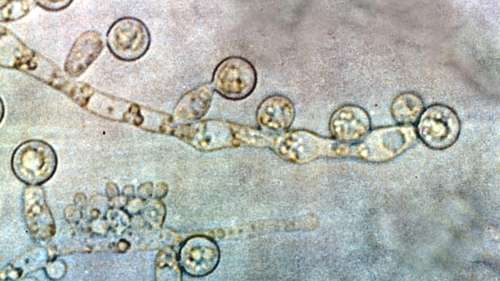Stealth fungus that causes thrush 'hides' from immune system, experts find out how

Experts from the University of Aberdeen have discovered how the fungus which causes thrush tries to hide from our body's defences.
Candida albicans can be deadly when it takes advantage of the weakened immune systems of cancer or transplant patients, and is also a common cause of thrush.
The fungus lives in most of us and is relatively harmless most of the time.
However, Candida can take hold and cause conditions such as thrush in babies, or the yeast infections that many women suffer after antibiotic treatments. If our defences become weakened, as can happen in cancer or transplant patients, the fungus can be deadly.
In a significant new study, published today in Nature Microbiology, researchers from the University of Aberdeen's world-leading Aberdeen Fungal Group and Medical Research Council Centre for Medical Mycology have revealed ways in which the fungus can 'hide' from our immune system.
Our body's immune system normally detects the fungus by interacting with specific molecules on its cell surface and then kills the fungal invader. Meanwhile, when the fungus senses the lactic acid we produce as part of a normal, healthy lifestyle, it changes its cell surface to make it more difficult for our immune system to detect and kill it.
The research, led by Professor Al Brown from the Aberdeen Fungal Group and funded by the European, Medical, and Biotechnology and Biological Sciences Research Councils, identifies the mechanisms that help the fungus mask itself from our immune detection system.
"We've discovered that this fungus is a moving target for our immune defences. It is very good at adapting to the environments within us and, through evolution, it has developed new ways to avoid being detected by our defences, said Professor Brown. "The fungus is playing a deadly game of hide-and-seek."
He continued: "Whilst for many healthy individuals Candida albicans is not a problem, and thrush infections are generally straightforward to treat, Candida can be a major health concern for some hospitalised patients. So it is important to work out how this fungus survives inside us so that we can develop ways to tip the balance back in favour of the patient.
"Thanks to funding from the Medical Research Council and with the help of our partners at the Radboud University in Nijmegen, the Netherlands, we are now starting to define how these discoveries, which were made under well-defined laboratory conditions, relate to infections in real patients."
More information: Elizabeth R. Ballou et al. Lactate signalling regulates fungal β-glucan masking and immune evasion, Nature Microbiology (2016). DOI: 10.1038/nmicrobiol.2016.238
Journal information: Nature Microbiology
Provided by University of Aberdeen


















